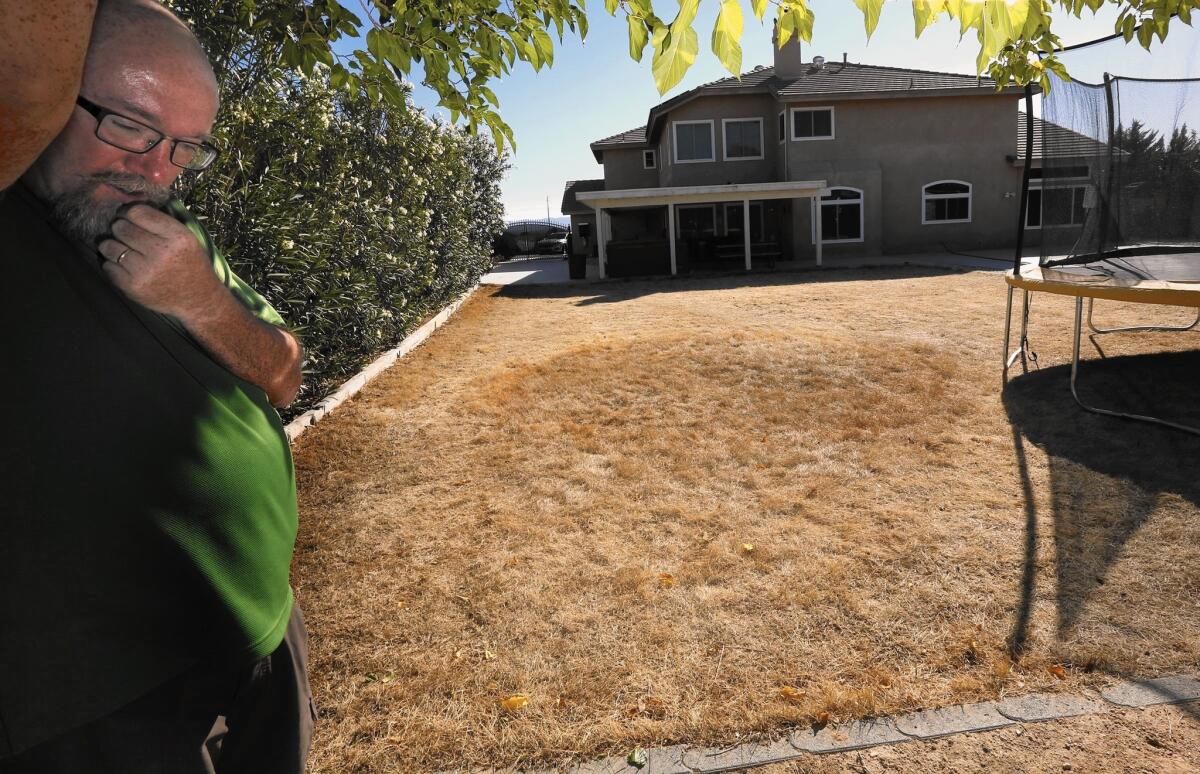Cities and private equity firms fight over ownership of water systems

Apple Valley residents were among the millions of Californians who cut back on water use during the state-mandated water restrictions this spring.
Unlike most, however, their monthly water bills from their privately owned water provider, Park Water Co. in Downey, contained a rude surprise: a surcharge of 5% â for using less water.
For the town of 70,000, the surcharge amounted to the last straw in a years-long tussle with Park Water, which is owned by private equity giant Carlyle Group in Washington, D.C.
------------
FOR THE RECORD:
Water disputes: In the Oct. 15 Business section, an article about legal fights over water systems included a quote from a California Court of Appeal decision about monopolists being unpopular and King George IIIâs âchokeholdâ on government. A subsequent court order left the judgment in the case involving Golden State Water Co. and the Casitas Municipal Water District intact but deleted the language quoted. â
------------
Water and Power is The Timesâ guide to the drought. Sign up to get the free newsletter >>
Apple Valley wanted out after absorbing rate hikes totaling 68% over the last 13 years and facing a proposal for an additional 31% rise over the next three years. It issued a formal offer to the Carlyle affiliate: Sell the system to us or risk having it condemned.
âWater is a public asset and should be controlled by the community, not subject to corporate greed,â said Town Manager Frank Robinson. âYou canât live without water.â
The fight in San Bernardino County is part of a wider tug of war between cities and private owners over water systems. More broadly, the controversy is over the degree to which Wall Street and other private parties should be controlling basic municipal infrastructure such as water systems and parking meters.
Infrastructure is a booming segment of the private equity business, one on which pension funds such as the California Public Employeesâ Retirement System increasingly rely to meet their investment targets.
Worldwide, 235 cities â including Paris, Budapest and Buenos Aires â in 37 countries have taken stronger or total control of their water systems in the last five years, according to a study published this year by a consortium of public interest groups led by Transnational Institute in Amsterdam.
In the U.S., 58 cities have taken or retaken control of private systems in the period, with the pace accelerating, the study said. Earlier this summer, the city of Missoula, Mont., won a court order condemning its water system, which is owned by Carlyleâs Park Water.
Christopher Schilling, Park Waterâs chief executive, said its rates are competitive with those of municipal owners.
âIf you have a high water bill in Apple Valley, you use a lot of water,â he said. âThe reality is, these systems are largely fixed costs. With declining unit sales, you almost have to raise rates, regardless of who owns the system.â
But to many residents, high bills donât reflect high water use. Lance Arnt, an Apple Valley high school teacher, said he was able to get his bill down to about $85 a month only after severely cutting back his water use.
âWe took out our front lawn,â he said. âOur backyard is a field of hay, basically.â
California municipalities have been particularly active in reclaiming water systems. The cities of Claremont and Ojai are involved in fights to condemn systems owned by Golden State Water Co., a unit of American States Water Co. in San Dimas.
The main issue: fast-rising rates.
Claremont said its rates have doubled since 2004 and now average 50% to more than 100% higher than those of neighboring towns on municipal systems.
âItâs been brewing for a long time, the last two decades,â said Bevin Handel, a city spokeswoman in Claremont, where voters overwhelmingly approved a $135-million bond issue last year to buy the system.
NEWSLETTER: Get essential California headlines delivered daily >>
An Ojai report said the townâs rates have increased an average of 8% a year over the last 22 years compared with 4.2.% for the adjacent Casitas Municipal Water District, which is moving to condemn the system on behalf of Ojai.
Public-ownership advocates are irked that the increases are aimed at preserving companiesâ return on capital â usually more than 8% â and that the hikes are approved by the California Public Utilities Commission. PUC officials did not respond to requests for comment.
âWhat gnaws on people most is that when they go through a downturn, they donât get a guaranteed rate of return,â Apple Valleyâs Robinson said. âThey trim, they struggle. But even in bad times, these rate increases just kept coming.â
Private water advocates respond that the PUC allows such profits but, depending on a companyâs operating efficiencies and other factors, doesnât guarantee them.
The average water bill fell last year because of conservation measures in the worsening drought. In Apple Valley, the monthly bill from Park Water hit an average of $76.80 in 2013 and dropped to $60.27 last year, including surcharges, according to an April report by the California State Auditor.
Still, residents last year paid 53.6% more than what residents in neighboring Victorville paid for municipal-provided water and 67.1% more than what those in nearby Hesperia paid for city water, the report found. The municipal systems didnât assess surcharges.
In Ojai, a state appeals court framed the issue broadly in rejecting Golden State Waterâs challenge of the Casitas water districtâs use of municipal financing to fund its takeover.
âMonopolists have long been unpopular in this country,â the court said. âWhen King George IIIâs chokehold on government led to intolerable levels of taxation, he was forced to divest his holdings.... Nothing is more necessary to life than water.â
Private companies said they are singled out unfairly because their rates reflect the true cost of supplying water while cities often subsidize rates with money from property taxes or other revenue.
âWe sort of get crucified because weâre so upfront and transparent with our rates,â said Denise Kruger, Golden Stateâs senior vice president of regulated utilities.
Private water advocates noted that only a tiny percentage of the thousands of privately owned systems in the U.S. have gone public in recent years. The number of Americans served by the private industry, about 15% of the countryâs population, hasnât changed much over time.
Some municipalities continue to turn to private companies. The city of Rialto in San Bernardino County last year agreed to contract out its water and sewer operations to a partnership led by San Francisco private equity firm Table Rock Capital and the American unit of French water company Veolia Environment.
The 30-year deal provided Rialto with $30 million in cash and $41 million in capital improvements.
The outright sale of public utilities and other infrastructure, called privatization, has been around since the 1970s in its modern form. Public opposition led governments to a hybrid version called public-private partnerships, in which governments retained ownership while private parties provided financing or operational support.
The pull is strong. Typically, state and local governments are cash-strapped and face huge capital costs for roads, sewers, water, electric utilities and other infrastructure. And they are hemmed in by taxpayers reluctant to approve new debt.
Global investors hungry for high returns, meantime, have been pouring money into Wall Streetâs booming private equity business. For the fastest-growing sector â infrastructure â firms raised $32.4 billion in funds last year, a huge increase from $3.6 billion in 2005, according to the research firm PitchBook Data Inc.
CalPERS has said it intends to more than double its investment in such funds from two years ago to about $3 billion of its $300-billion portfolio.
The increasing private interest in public systems has only heightened concerns over whether owning, managing or financing basic municipal infrastructure should be outsourced at all.
Skeptics said the deals are usually boondoggles because private investors require such high profit margins â a 12% to 15% return on capital is common â that they invariably end up costing ratepayers more.
Local political leaders use such deals to avoid hard choices between crumbling infrastructure and debt-shy taxpayers, said Donald Cohen, executive director of In the Public Interest, a Washington research group.
âThey think theyâre offloading political costs,â he said, âand theyâre not.â
ALSO
Indiaâs coal-fueled economy taking a toll on environment and rural villagers
âRolling coalâ: Modified trucks blast Priuses with clouds of black smoke
Pearl Harbor welcomes the Swamp Ghost, which has a chilling story to tell
More to Read
Inside the business of entertainment
The Wide Shot brings you news, analysis and insights on everything from streaming wars to production â and what it all means for the future.
You may occasionally receive promotional content from the Los Angeles Times.











